李长栓《非文学翻译理论与实践》第2版复习笔记(核心句分析 克服句法障碍的有效手段)【圣才出品】
李长栓《非文学翻译理论与实践》第2版复习笔记(句子的长短和简繁)【圣才出品】

李长栓《⾮⽂学翻译理论与实践》第2版复习笔记(句⼦的长短和简繁)【圣才出品】李长栓《⾮⽂学翻译理论与实践》第2版复习笔记第10章句⼦的长短和简繁⼀、简明英语提倡短句和简单句简明语⾔的原则之⼀是使⽤短句,避免长句。
英语产⽣长句的原因,⼀是流⽔句,⼆是复杂的嵌套句式。
例如:流⽔句:Janice is an enthusiastic basketball player,and she is the top-scoring player on our team,but unfortunately,she will not be able to play in tomorrow’s game,for her sprained ankle is not completely healed.建议改为:Janice is an enthusiastic basketball player,and the top-scoring player on our team.Unfortunately,she will not be able to play in tomorrow’s game,for her sprained ankle is not completely healed.复杂句:The train stopped at the small station,which was a few miles from the center of the city,because it was a local run that picked up passengers who chose to ride in the late morning.建议改为:The train stopped at the small station a few miles from the center of the city.It was a local run that picked up passengers who chose to ride in the late moming.⼆、汉译英时化长为短,化繁为简汉译英时有两类长句值得注意。
李长栓《非文学翻译理论与实践》第2版复习笔记(简明英语和简明英语运动)【圣才出品】

李长栓《非文学翻译理论与实践》第2版复习笔记第3章简明英语和简明英语运动一、翻译是一种写作形式1.翻译和写作的关系翻译就是写作,只是参照物不同。
所以,写作时应遵循的原则,翻译时也应遵循。
2.好英语的概念(1)很多学习外语的人认为,一个句子中抽象名词用得越多,越文雅。
尤其是政府公文、法律文书,属于正式文体,更应当多用抽象名词。
我们受这个观点的影响很大,所以倾向于把英文句子写得很抽象,恨不得把所有的词都变成名词。
例:①Our lack of knowledge about local conditions precluded determination of committee action effectiveness in fund allocation to those areas in greatest need of assistance.②Because we knew nothing about local conditions,we could not determine how effectively the committee had allocated funds to areas that most needed assistance.【解析】笔者曾经在学生中做过调查,绝大多数选择①。
但写作指南中给出的答案是②。
①句之所以不好,是由于抽象名词太多。
(2)美国前总统克林顿执政时,与副总统戈尔共同发布了一项总统备忘录,要求所有的政府文件使用简明英语(plain English),以更好地达到交流的目的。
3.关于简明英语的总统备忘录(1)美国总统关于使用白话的备忘录:Presidential Memorandum on Plain LanguageThe white HouseJune l,1998Memorandum for the Heads of ExecutiveDepartments and Agencies…to make the Government more responsive,accessible,and understandable in its communications with the public.The Federal Government’s writing must be in plain language.By using plain language,we send a clear message about what the Government is doing,what it requires,and what services it offers.Plain language saves the Government and the private sector time,effort,and money.…Plain language documents have logical organization,easy-to-read design features,and use:·Common,everyday words,except for necessary technical terms;·“you”and other pronouns;·the active voice;and·short sentences.……(Presidential Sig.)William Clinton为了建立“亲民”形象,美国政府明确要求,美国联邦政府的所有文件,一律使用简明英语;以前没有使用简明英语的,限期“整改”,把推广简明英语提高到了“讲政治”的高度。
李长栓《非文学翻译理论与实践》第2版复习笔记(新旧信息和信息流动)【圣才出品】

李长栓《非文学翻译理论与实践》第2版复习笔记(新旧信息和信息流动)【圣才出品】李长栓《非文学翻译理论与实践》第2版复习笔记第8章新旧信息和信息流动一、介绍翻译、写作时信息出现的先后顺序要符合人的认识规律,即把旧信息(已知信息)放在前面,把新信息(未知信息)放在后面。
这样可以加强句子之间的联系,帮助读者抓住论证的线索。
在语篇分析中,按句子的线性顺序把句子切分为主位(theme)和述位(rheme)两部分。
主位一般只含有已知信息,述位通常是新信息,是交际的重心。
在组句成篇的过程中,主位和述位层层推进,形成一种主位推进模式。
例如:The Court of Auditors’report criticizes agricultural spending and proposes some new measures to prevent fraud.Their proposals include setting up a special task force with powers to search farms.Such powers are not normally granted to Commission officials,but fraud prevention is now one of the EU’s main priorities.在上例中,the Court of Auditors’report是已知信息或者作者假定读者已知的信息,它是下面论述的出发点,所以放在句子开头;their proposals属于已知信息,放在句首,因为上一句中提到proposes some measures;such powers是已知信息,放在句首,因为上一句提到with powers to search farms.了解信息结构的特点,对于翻译有重要的意义。
英汉的信息结构是相似的,翻译时不应破坏。
为了促进信息的流动,翻译(和写作)时可以从下面几个方面入手:二、把不重要的信息移向句子左侧这样可以避免结尾有气无力(A是修改前的句子,B是修改后的句子),例:A:Complete institutional reform is advocated by the report in most cases.B:What the report advocates,in most cases,is complete institutional reform.三、把重要的信息移向句子右侧A:Some complex issues run through these questions.B:Through these questions run some complex issues.翻译中可以使用类似方法,例:保护劳动力的再生产和合理配置劳动力资源是市场经济的客观要求。
李长栓《非文学翻译理论与实践》第2版复习笔记(简明英语的基本原则)【圣才出品】

李长栓《非文学翻译理论与实践》第2版复习笔记第4章简明英语的基本原则简明英语首先要求确定写作的目的和读者群,根据读者的需求和知识水平,确定写作的内容和风格。
从简明英语运动的发展来看,简明英语一直是面向大众的英语。
由于大众的受教育程度不一定很高,所以,简明英语从内容、句式到用词,都力图做到清晰易懂、言简意赅;形式上做到一目了然。
简明英语不仅受到一般公众的欢迎,也受到专业人士喜爱,所以,即使撰写学术论文,也提倡使用简明英语。
一、篇章布局合理简明英语要有清楚的条理。
如果要传达的信息很多,一定要把信息拆分成符合逻辑的信息单元。
每个单元使用标题和小标题。
标题和小标题要有内容,不仅仅是为了打破文件形式的单调。
对于每一个信息单元,应当首先陈述要点,然后予以解释和论证。
遇到复杂的信息,要使用列表(bullet points),或举例、画图加以解释。
二、言简意赅“Vigorous writing is concise.A sentence should contain no unnecessary words, a paragraph no unnecessary sentences,for the same reason that a drawing should have no unnecessary lines and a machine no unnecessary parts.”—William Strunk,Jr.,The Elements of Style 简明英语的一个重要特点是言简意赅,要言不烦。
文件是否受到重视,不在于它的长短。
很多国际机构和政府部门就明确规定不接受过长的文件。
要缩短文件,做到言简意赅,可以从很多小的地方着手:1.避免重复(1)已经说过的,不再说;读者知道的,不再说;读者可以推知的,不再说。
(2)消除意思重复,可以使用以下手段:①两个词意思相同的,只留一个英语中有一些同义词对(redundant pairs),其中一个来自法语或拉丁语,意思几乎相同,使用时只需保留一个简单的。
李长栓《非文学理论翻译与实践》(第2版新版)配套题库(第5~9章)【圣才出品】

李长栓《非文学理论翻译与实践》(第2版新版)配套题库第5章Google、电子辞书及其在翻译中的运用Ⅰ.词类转换1.你必须好好地照顾病人。
【译文】You must take good care of the patient.【解析】原句中的“照顾”转译成了名词care,副词“好好地”转译成了英语形容词good,更符合英语的表达习惯。
2.他在讲话中特别强调提高产品质量。
【译文】In his speech he laid special stress on raising the quality of the products.【解析】原句中的动词“强调”转译成了名词stress,与此同时,副词“特别”转译成了英语形容词special。
3.绝对不许违反这个原则。
【译文】No violation of this principle can be tolerated.【解析】原句中的动词“违反”转译成了名词violation,与此同时,而起修饰作用的副词“不许”转译成了英语形容词no。
4.林则徐认为,要成功地禁止鸦片买卖,就得首先把鸦片焚毁了。
【译文】Lin Zexu believed that a successful ban of the opium trade must bepreceded by the destruction of the drug itself.【解析】原句中的动词“禁止”翻译为了名词ban,而副词“成功地”转译成了形容词successful。
5.获悉贵国遭受地震,我们极为关切。
【译文】We are deeply concerned at the news that your country has been struck by an earthquake.【解析】原句中的动词“关切”转换为了英语的形容词concerned,更符合英语的表达习惯。
6.我为她的健康担忧。
【译文】I am anxious about her health.【解析】动词“担忧”转译为形容词anxious。
李长栓《非文学翻译理论与实践》第2版翻译示例汇总(句子的长短和简繁)【圣才出品】

李长栓《非文学翻译理论与实践》第2版翻译示例汇总第10章句子的长短和简繁10.2.1.1断句1.在市场经济体制下,收入分配机制与竞争机制相联系,必然造成社会成员之间在收入分配方面的不均等,甚至收入相差十分悬殊,强者成为富翁,弱者陷于困境。
为了解决这一社会问题,就需要运用政府的力量对社会经济生活进行干预,通过提供社会保障措施,通过对社会成员的收入进行必要的再分配调节方式,将高收入者的一部分收入适当转移给另一部分缺少收入的人,从而在一定程度上缩小社会成员之间的贫富差距,弥补市场经济的缺陷,缓和社会矛盾,以促进社会公平目标的实现。
(两个句号)【译文】In a market economy,where income distribution is a function of competition,wealth is inevitably distributed unequally.Sometimes the income gap widens because the strong gets richer and the weak poorer.This is a problem that can be addressed only with government intervention.Social security is a form of intervention that increases social equity by redistributing wealth,for part of the income of the rich is rechannelled to the lower income.By narrowing the income gap and mitigating the flaws of the market economy in some extent,social security enhances social cohesion and equity.(五个句号)2.一九七八年我们党的十一届三中全会才制定了一系列新的正确的路线、方针和政策,根本内容就是建设具有中国特色的社会主义。
李长栓《非文学翻译理论与实践》第2版复习笔记(隐喻、俗语等文化词语的翻译)【圣才出品】

李长栓《非文学翻译理论与实践》第2版复习笔记第13章隐喻、俗语等文化词语的翻译一、隐喻的概念1.比喻是描写事物或说明道理时,用同它有相似点的别的事物或道理来打比方。
隐喻,也叫暗喻,是比喻的一种形式。
隐喻有本体与喻体,用“是”、“成为”等联接本体和喻体。
2.与隐喻相关的是明喻、借喻、借代、比拟等。
(1)明喻是有本体和喻体,并且以“如”、“像”、“若”等联系词连接本体和喻体的修辞方法。
(2)借喻既没有比喻词,本体也不出现,而是直接把喻体用在本体应该出现的地方。
借喻的基本形式是以乙代甲。
例:“如果不打落水狗,它一旦跳起来,就要咬你,最低限度也溅你一身的污泥”。
【解析】此句中“落水狗”比喻挨了打的敌人。
(3)借代是用甲事物来代替乙事物,甲乙两事物之间的联系是有某些相关之处。
例:那边来了个红领巾。
【解析】“红领巾”是借代,是用少先队员的标志来代替少先队员。
不能说少年队员像红领巾。
(4)比拟是按照人的想象和联想直接把人当作物或物当作人来写。
例:鸟儿歌唱,花儿欢笑。
【解析】“鸟”和“花”本来不会像人那样一。
歌唱”和“欢笑”,但是人可以想象它们会歌唱、会欢笑。
3.在英语中,大多数字典和教科书对隐喻的定义为a comparison between two things,based on resemblance or similarity,without using“like”or“as”。
例:a submarine sandwicha branch of governmentThere are plenty more fish in the sea.4.英语中与隐喻有关的概念很多simile(明喻):A comparison using“like”or“as”。
如Her face was pale as the moon;metonym(换喻):The substitution of one term for another with which it is commonly associated or closely related。
李长栓《非文学翻译理论与实践》第2版复习笔记(新旧信息和信息流动)【圣才出品】

李长栓《非文学翻译理论与实践》第2版复习笔记第8章新旧信息和信息流动一、介绍翻译、写作时信息出现的先后顺序要符合人的认识规律,即把旧信息(已知信息)放在前面,把新信息(未知信息)放在后面。
这样可以加强句子之间的联系,帮助读者抓住论证的线索。
在语篇分析中,按句子的线性顺序把句子切分为主位(theme)和述位(rheme)两部分。
主位一般只含有已知信息,述位通常是新信息,是交际的重心。
在组句成篇的过程中,主位和述位层层推进,形成一种主位推进模式。
例如:The Court of Auditors’report criticizes agricultural spending and proposes some new measures to prevent fraud.Their proposals include setting up a special task force with powers to search farms.Such powers are not normally granted to Commission officials,but fraud prevention is now one of the EU’s main priorities.在上例中,the Court of Auditors’report是已知信息或者作者假定读者已知的信息,它是下面论述的出发点,所以放在句子开头;their proposals属于已知信息,放在句首,因为上一句中提到proposes some measures;such powers是已知信息,放在句首,因为上一句提到with powers to search farms.了解信息结构的特点,对于翻译有重要的意义。
英汉的信息结构是相似的,翻译时不应破坏。
为了促进信息的流动,翻译(和写作)时可以从下面几个方面入手:二、把不重要的信息移向句子左侧这样可以避免结尾有气无力(A是修改前的句子,B是修改后的句子),例:A:Complete institutional reform is advocated by the report in most cases.B:What the report advocates,in most cases,is complete institutional reform.三、把重要的信息移向句子右侧A:Some complex issues run through these questions.B:Through these questions run some complex issues.翻译中可以使用类似方法,例:保护劳动力的再生产和合理配置劳动力资源是市场经济的客观要求。
李长栓《非文学翻译理论与实践》第2版复习笔记(英语词典和电子语料库在翻译中的运用)【圣才出品】
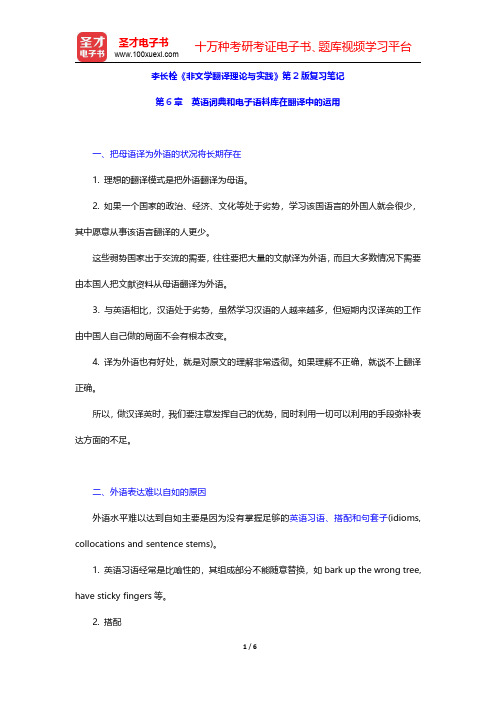
李长栓《非文学翻译理论与实践》第2版复习笔记第6章英语词典和电子语料库在翻译中的运用一、把母语译为外语的状况将长期存在1.理想的翻译模式是把外语翻译为母语。
2.如果一个国家的政治、经济、文化等处于劣势,学习该国语言的外国人就会很少,其中愿意从事该语言翻译的人更少。
这些弱势国家出于交流的需要,往往要把大量的文献译为外语,而且大多数情况下需要由本国人把文献资料从母语翻译为外语。
3.与英语相比,汉语处于劣势,虽然学习汉语的人越来越多,但短期内汉译英的工作由中国人自己做的局面不会有根本改变。
4.译为外语也有好处,就是对原文的理解非常透彻。
如果理解不正确,就谈不上翻译正确。
所以,做汉译英时,我们要注意发挥自己的优势,同时利用一切可以利用的手段弥补表达方面的不足。
二、外语表达难以自如的原因外语水平难以达到自如主要是因为没有掌握足够的英语习语、搭配和句套子(idioms, collocations and sentence stems)。
1.英语习语经常是比喻性的,其组成部分不能随意替换,如bark up the wrong tree, have sticky fingers等。
2.搭配(1)搭配分为有标记搭配和无标记搭配。
无标记搭配是指人们日常使用的普通搭配。
本章介绍的方法针对无标记搭配。
有标记搭配是指作者为了制造某种语言效果而创造出来的搭配。
例:The driver of the car was badly damaged.【解析】damage的直接宾语一般是无生命的事物,但在本句中,作者却用有生命的driver作damage的逻辑宾语,意图是要拿车祸本身开玩笑,制造幽默的效果。
(2)搭配还可以分为语法搭配(grammatical collocations)和词汇搭配(1exicalcollocations)。
①语法搭配是一个短语,由一个主导词(dominant word),即名词、形容词和动词,加一个介词或不定式、从句等语法结构组成。
李长栓《非文学理论翻译与实践》(第2版新版)配套题库(第10~13章)【圣才出品】
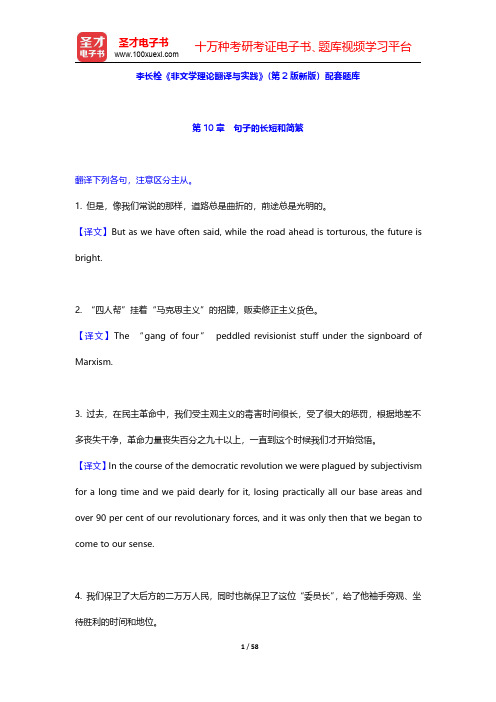
李长栓《非文学理论翻译与实践》(第2版新版)配套题库第10章句子的长短和简繁翻译下列各句,注意区分主从。
1.但是,像我们常说的那样,道路总是曲折的,前途总是光明的。
【译文】But as we have often said,while the road ahead is torturous,the future is bright.2.“四人帮”挂着“马克思主义”的招牌,贩卖修正主义货色。
【译文】The“gang of four”peddled revisionist stuff under the signboard of Marxism.3.过去,在民主革命中,我们受主观主义的毒害时间很长,受了很大的惩罚,根据地差不多丧失干净,革命力量丧失百分之九十以上,一直到这个时候我们才开始觉悟。
【译文】In the course of the democratic revolution we were plagued by subjectivism for a long time and we paid dearly for it,losing practically all our base areas and over90per cent of our revolutionary forces,and it was only then that we began to come to our sense.4.我们保卫了大后方的二万万人民,同时也就保卫了这位“委员长”,给了他袖手旁观、坐待胜利的时间和地位。
【译文】In defending the200million people of the Great Rear Area,we protected this“generalissimo”as well and gave him both the time and the space to sit around waiting for victory with folded arms.5.在农民群众方面,几千年来都是个体经济,一家一户就是一个生产单位。
李长栓《非文学翻译理论与实践》第2版复习笔记(原文错误的识别与翻译方法)【圣才出品】

李长栓《非文学翻译理论与实践》第2版复习笔记第16章原文错误的识别与翻译方法翻译时只要努力理解原文,核对自己没有把握的事实,很容易发现原文的错误。
实践中原文错误的处理方法有四种:在译文中改正,不加说明;在译文中改正,加以说明;照原样译出,不加说明;照原样译出,加以说明。
从各方面看,改正或指出原文错误更为可取。
一、发现原文错误1.专业译员不是翻译文字,而是翻译意思,因此会十分注意文章的内在联系,注意文章的连贯性,对于自己不敢确定的事实,都要一一核实,决不想当然。
所以,除了显而易见的打印错误外,译者时常发现原文的笔误和事实性错误。
2.翻译时,只要把自己作为一个真正需要了解原文提供信息的读者,而不是一个“翻译”,从而真正去理解上下文逻辑关系,按照常识及各种背景知识作出判断,对原文事实进行核实,会很容易发现原文的不当或错误之处(如果有)。
例:At the beginning of1997macroeconomic indicators showed a decline in industrial output,retail trade and exports.All this led to the drop in GDP in that year by one-fifth of its value in1998(-19.3%).Thus,the FRY entered the last year of the20th century as one of the poorest countries in Europe.【译文】1999年初,宏观经济指数表明,工业产出、零售和出口呈下降趋势,导致1999年国内总产值比1998年下降五分之一(负19.3%),因此,南斯拉夫联盟共和国进入20世纪最后一年时,成为欧洲最贫困的国家。
【解析】原文说1997年GDP比1998年下降五分之一,又说1997年是20世纪最后一年,这显然不符合逻辑。
李长栓《非文学翻译理论与实践》第2版复习笔记(文学翻译与非文学翻译)【圣才出品】
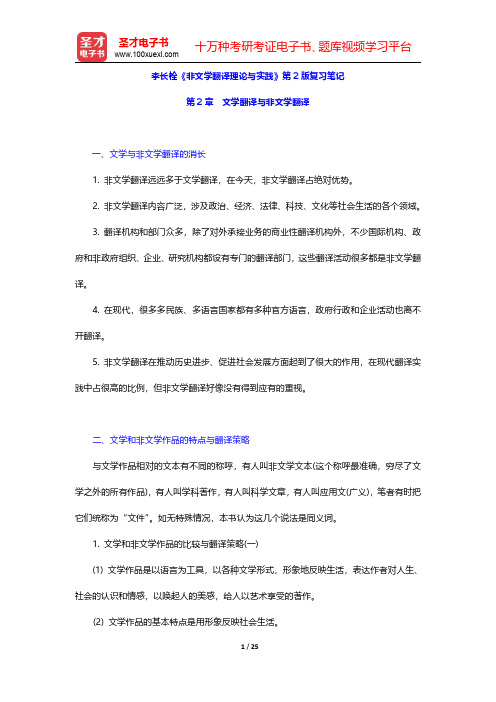
李长栓《非文学翻译理论与实践》第2版复习笔记第2章文学翻译与非文学翻译一、文学与非文学翻译的消长1.非文学翻译远远多于文学翻译,在今天,非文学翻译占绝对优势。
2.非文学翻译内容广泛,涉及政治、经济、法律、科技、文化等社会生活的各个领域。
3.翻译机构和部门众多,除了对外承接业务的商业性翻译机构外,不少国际机构、政府和非政府组织、企业、研究机构都设有专门的翻译部门,这些翻译活动很多都是非文学翻译。
4.在现代,很多多民族、多语言国家都有多种官方语言,政府行政和企业活动也离不开翻译。
5.非文学翻译在推动历史进步、促进社会发展方面起到了很大的作用,在现代翻译实践中占很高的比例,但非文学翻译好像没有得到应有的重视。
二、文学和非文学作品的特点与翻译策略与文学作品相对的文本有不同的称呼,有人叫非文学文本(这个称呼最准确,穷尽了文学之外的所有作品),有人叫学科著作,有人叫科学文章,有人叫应用文(广义),笔者有时把它们统称为“文件”。
如无特殊情况,本书认为这几个说法是同义词。
1.文学和非文学作品的比较与翻译策略(一)(1)文学作品是以语言为工具,以各种文学形式,形象地反映生活,表达作者对人生、社会的认识和情感,以唤起人的美感,给人以艺术享受的著作。
(2)文学作品的基本特点是用形象反映社会生活。
在文学作品的创作过程中,作家始终进行的是形象思维的活动(或方式)。
它具有三个特点:首先,作家运用各种艺术手段把从生活中得到的大量感性材料熔铸成活生生的艺术形象;其次,始终离不开想象(幻想、联想)和虚构;第三,始终伴随着强烈的感情活动。
(3)文学作品与学科著作的区别①从内容来说,它们虽然都是客观事物的反映,但学科著作采取了“对世界的科学的掌握方式”,材料、事件、事物及所举的数字、图表、例子必须准确可靠,一切都有具有客观的实在性;而文学作品则采取了“对世界的艺术的掌握方式”,它的人物、事件、环境等都没有绝对性,跟现实未必吻合,一切都具有客观情理性。
李长栓《非文学翻译理论与实践》第2版复习笔记(译文臃肿和减肥方法)【圣才出品】
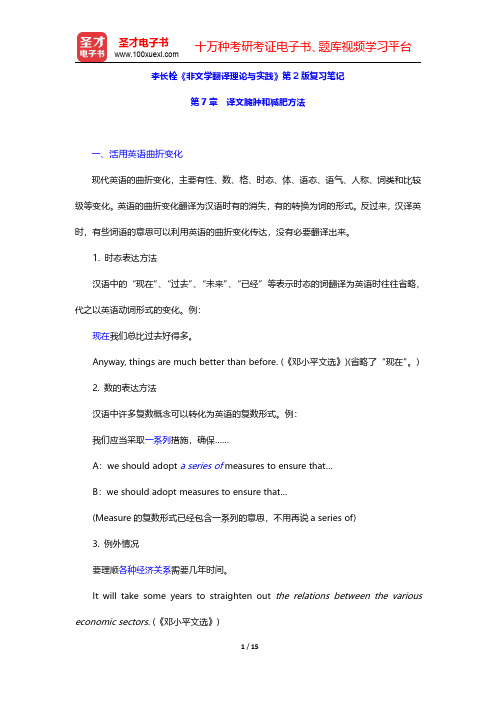
李长栓《非文学翻译理论与实践》第2版复习笔记第7章译文臃肿和减肥方法一、活用英语曲折变化现代英语的曲折变化,主要有性、数、格、时态、体、语态、语气、人称、词类和比较级等变化。
英语的曲折变化翻译为汉语时有的消失,有的转换为词的形式。
反过来,汉译英时,有些词语的意思可以利用英语的曲折变化传达,没有必要翻译出来。
1.时态表达方法汉语中的“现在”、“过去”、“未来”、“已经”等表示时态的词翻译为英语时往往省略,代之以英语动词形式的变化。
例:现在我们总比过去好得多。
Anyway,things are much better than before.(《邓小平文选》)(省略了“现在”。
)2.数的表达方法汉语中许多复数概念可以转化为英语的复数形式。
例:我们应当采取一系列措施,确保……A:we should adopt a series of measures to ensure that…B:we should adopt measures to ensure that…(Measure的复数形式已经包含一系列的意思,不用再说a series of)3.例外情况要理顺各种经济关系需要几年时间。
It will take some years to straighten out the relations between the various economic sectors.(《邓小平文选》)二、调整篇章衔接手段英语和汉语的语篇衔接手段均包括照应、替代、省略、连接、重复、同义词、反义词、上下义关系、搭配等。
汉语大量使用重复,翻译为英语后应考虑是否要转换为照应、替代和省略等。
遇到汉语重复性衔接可以采取以下处理方法:1.动词性重复如果是动词性重复,可以变为动词性替代或省略。
例:“文化大革命”十年浩劫,中国吃了苦头。
中国吃苦头不只这十年,这以前,从一九五七年下半年开始,我们就犯了“左”的错误。
China suffered greatly from the ten-year disaster,the“cultural revolution”.In fact,not just from that:as early as the second half of l957we began to make“Left”mistakes.(《邓小平文选》)2.名词性重复如果是名词性重复,可以采取以下方法:(1)用代词照应。
李长栓《非文学翻译理论与实践》第2版复习笔记(批判性阅读与批判性思维 译文连贯的保障)【圣才出品】

李长栓《非文学翻译理论与实践》第2版复习笔记第17章批判性阅读与批判性思维:译文连贯的保障一、批判性阅读和批判性思维的概念1.定义批判性阅读(critical reading)指认真、积极、深入和分析性的阅读,是在特定文本中发现信息和思想的技巧;批判性思维(critical thinking)指根据已有知识、常识或逻辑,深入思考阅读的内容是否正确,是对特定文本信息和思想进行评价的技巧,据此决定是否接受和相信该信息和思想。
例:“parents are buying expensive cars for their kids to destroy them”【解析】根据上下文判断them是指父母、孩子还是汽车,并判断文章论据是否支持该论断,属于批判性阅读。
如要进一步判断该论断的正确性,以及你作为读者是否应当支持这一论断,则需要批判性思维。
2.批判性阅读在先,批判性思维在后。
即只有我们完全理解了文本(通过批判性阅读),才能真正对其论断作出评价(进行批判性思维)。
3.在实践中,批判性阅读和批判性思维是相辅相成、相互促进的。
批判性思维允许我们在阅读时随时监测自己的理解的正确性。
如果我们感到某一论断十分荒诞或不合常理(批判性思维),我们就会更仔细地审查文本,检查我们的理解是否正确(批判性阅读)。
反之,批判性思维取决于批判性阅读,因为只有理解了文本(批判性阅读),才能批判性地思考文本(批判性思维)。
4.在翻译时,我们运用的正是批判性阅读和批判性思维。
对于待译文本,我们总是假定它前后一致、意思连贯。
在批判性地阅读原文时,我们力图发现原文的逻辑,从而真正理解原文。
如果发现某个地方比较奇怪,逻辑不通,或与我们的知识或常识不一致(批判性思维),就要进一步批判性地阅读,查阅资料,看是我们的理解错误,还是原文本身不通(一般情况下是我们的理解问题)。
5.在修改自己或别人的译文时,我们应当更具批判精神。
在阅读原文时,我们努力为作者的论断寻找其符合逻辑的证据;在审校译文时,我们努力找到译文不符合逻辑的地方,然后研究翻译是否错误。
李长栓《非文学翻译理论与实践》第2版复习笔记(语篇的衔接)【圣才出品】
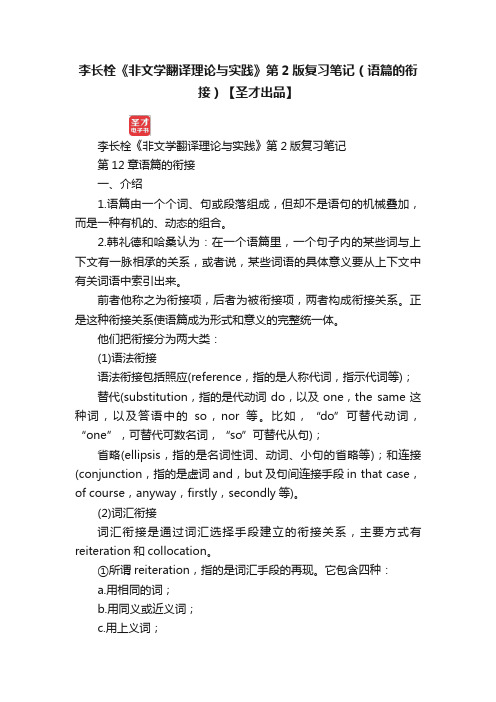
李长栓《非文学翻译理论与实践》第2版复习笔记(语篇的衔接)【圣才出品】李长栓《非文学翻译理论与实践》第2版复习笔记第12章语篇的衔接一、介绍1.语篇由一个个词、句或段落组成,但却不是语句的机械叠加,而是一种有机的、动态的组合。
2.韩礼德和哈桑认为:在一个语篇里,一个句子内的某些词与上下文有一脉相承的关系,或者说,某些词语的具体意义要从上下文中有关词语中索引出来。
前者他称之为衔接项,后者为被衔接项,两者构成衔接关系。
正是这种衔接关系使语篇成为形式和意义的完整统一体。
他们把衔接分为两大类:(1)语法衔接语法衔接包括照应(reference,指的是人称代词,指示代词等);替代(substitution,指的是代动词do,以及one,the same这种词,以及答语中的so,nor等。
比如,“do”可替代动词,“one”,可替代可数名词,“so”可替代从句);省略(ellipsis,指的是名词性词、动词、小句的省略等);和连接(conjunction,指的是虚词and,but及句间连接手段in that case,of course,anyway,firstly,secondly等)。
(2)词汇衔接词汇衔接是通过词汇选择手段建立的衔接关系,主要方式有reiteration和collocation。
①所谓reiteration,指的是词汇手段的再现。
它包含四种:a.用相同的词;b.用同义或近义词;c.用上义词;d.用统称词和代词。
②collocation是指相关词语的前后呼应,如“交通”、“客运”、“货运”、“道路”、“汽车”、“堵塞”、“燃油”就是经常出现在一起的词。
3.对于译者而言,掌握衔接手段的分类并不重要,重要的是了解英汉衔接手段的主要差异,从而在翻译时进行必要转换,使译文更加符合目的语的习惯。
多数情况下,汉译英意味着要把汉语的重复性衔接手段变为英语的省略性衔接手段;把汉语潜在的逻辑关系和层次关系用英语明示的连接词表示出来;英译汉时,则意味着把省略的东西补充出来。
李长栓《非文学翻译理论与实践》第2版复习笔记(语篇的衔接)【圣才出品】

李长栓《非文学翻译理论与实践》第2版复习笔记第12章语篇的衔接一、介绍1.语篇由一个个词、句或段落组成,但却不是语句的机械叠加,而是一种有机的、动态的组合。
2.韩礼德和哈桑认为:在一个语篇里,一个句子内的某些词与上下文有一脉相承的关系,或者说,某些词语的具体意义要从上下文中有关词语中索引出来。
前者他称之为衔接项,后者为被衔接项,两者构成衔接关系。
正是这种衔接关系使语篇成为形式和意义的完整统一体。
他们把衔接分为两大类:(1)语法衔接语法衔接包括照应(reference,指的是人称代词,指示代词等);替代(substitution,指的是代动词do,以及one,the same这种词,以及答语中的so,nor等。
比如,“do”可替代动词,“one”,可替代可数名词,“so”可替代从句);省略(ellipsis,指的是名词性词、动词、小句的省略等);和连接(conjunction,指的是虚词and,but及句间连接手段in that case,of course,anyway,firstly,secondly等)。
(2)词汇衔接词汇衔接是通过词汇选择手段建立的衔接关系,主要方式有reiteration和collocation。
①所谓reiteration,指的是词汇手段的再现。
它包含四种:a.用相同的词;b.用同义或近义词;c.用上义词;d.用统称词和代词。
②collocation是指相关词语的前后呼应,如“交通”、“客运”、“货运”、“道路”、“汽车”、“堵塞”、“燃油”就是经常出现在一起的词。
3.对于译者而言,掌握衔接手段的分类并不重要,重要的是了解英汉衔接手段的主要差异,从而在翻译时进行必要转换,使译文更加符合目的语的习惯。
多数情况下,汉译英意味着要把汉语的重复性衔接手段变为英语的省略性衔接手段;把汉语潜在的逻辑关系和层次关系用英语明示的连接词表示出来;英译汉时,则意味着把省略的东西补充出来。
由于汉语连接词趋于增加,所以英译汉时连接词很少被省略。
李长栓《非文学理论翻译与实践》(第2版新版)配套题库(第10~13章)【圣才出品】

李长栓《⾮⽂学理论翻译与实践》(第2版新版)配套题库(第10~13章)【圣才出品】李长栓《⾮⽂学理论翻译与实践》(第2版新版)配套题库第10章句⼦的长短和简繁翻译下列各句,注意区分主从。
1.但是,像我们常说的那样,道路总是曲折的,前途总是光明的。
【译⽂】But as we have often said,while the road ahead is torturous,the future is bright.2.“四⼈帮”挂着“马克思主义”的招牌,贩卖修正主义货⾊。
【译⽂】The“gang of four”peddled revisionist stuff under the signboard of Marxism.3.过去,在民主⾰命中,我们受主观主义的毒害时间很长,受了很⼤的惩罚,根据地差不多丧失⼲净,⾰命⼒量丧失百分之九⼗以上,⼀直到这个时候我们才开始觉悟。
【译⽂】In the course of the democratic revolution we were plagued by subjectivism for a long time and we paid dearly for it,losing practically all our base areas and over90per cent of our revolutionary forces,and it was only then that we began to come to our sense.4.我们保卫了⼤后⽅的⼆万万⼈民,同时也就保卫了这位“委员长”,给了他袖⼿旁观、坐待胜利的时间和地位。
【译⽂】In defending the200million people of the Great Rear Area,we protected this“generalissimo”as well and gave him both the time and the space to sit around waiting for victory with folded arms.5.在农民群众⽅⾯,⼏千年来都是个体经济,⼀家⼀户就是⼀个⽣产单位。
李长栓《非文学翻译理论与实践》第2版复习笔记(酌情改写原文)【圣才出品】
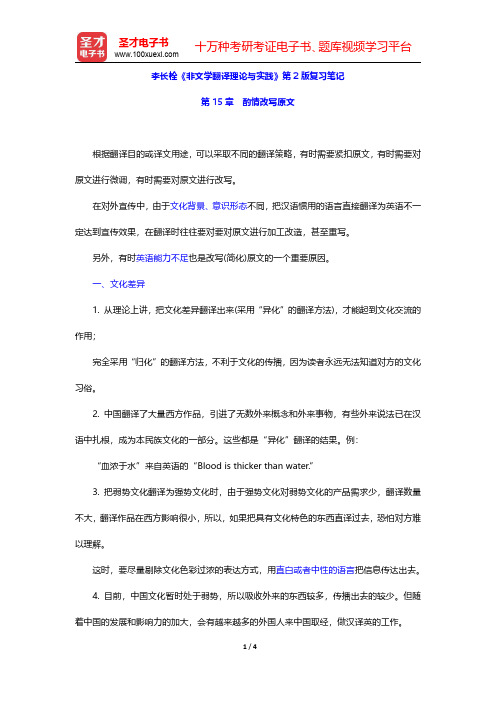
李长栓《非文学翻译理论与实践》第2版复习笔记第15章酌情改写原文根据翻译目的或译文用途,可以采取不同的翻译策略,有时需要紧扣原文,有时需要对原文进行微调,有时需要对原文进行改写。
在对外宣传中,由于文化背景、意识形态不同,把汉语惯用的语言直接翻译为英语不一定达到宣传效果,在翻译时往往要对要对原文进行加工改造,甚至重写。
另外,有时英语能力不足也是改写(简化)原文的一个重要原因。
一、文化差异1.从理论上讲,把文化差异翻译出来(采用“异化”的翻译方法),才能起到文化交流的作用;完全采用“归化”的翻译方法,不利于文化的传播,因为读者永远无法知道对方的文化习俗。
2.中国翻译了大量西方作品,引进了无数外来概念和外来事物,有些外来说法已在汉语中扎根,成为本民族文化的一部分。
这些都是“异化”翻译的结果。
例:“血浓于水”来自英语的“Blood is thicker than water.”3.把弱势文化翻译为强势文化时,由于强势文化对弱势文化的产品需求少,翻译数量不大,翻译作品在西方影响很小,所以,如果把具有文化特色的东西直译过去,恐怕对方难以理解。
这时,要尽量剔除文化色彩过浓的表达方式,用直白或者中性的语言把信息传达出去。
4.目前,中国文化暂时处于弱势,所以吸收外来的东西较多,传播出去的较少。
但随着中国的发展和影响力的加大,会有越来越多的外国人来中国取经,做汉译英的工作。
5.由于文化差异,在翻译中会对原文进行一定的改写或删减。
6.中文在介绍产品时,往往使用许多华而不实之辞,而英语崇尚质朴,实事求是,所以翻译时应注意对原文进行简化或改写。
例:【英语说明】MA PROMESSE Moisturizing Toner contains natural licorice, astragalus,and ginseng.It is absolutely alcohol free.It is a deep cleanser and moisturizes,hydrates and tones the skin.After application,the skin feels fresh, clean and revitalized.Suitable for all skin types.【汉语说明】诺美思柔嫩爽肤水温和配方,不含酒精,能够彻底清除肌肤深层残垢。
李长栓《非文学翻译理论与实践》第2版复习笔记(句子的长短和简繁)【圣才出品】
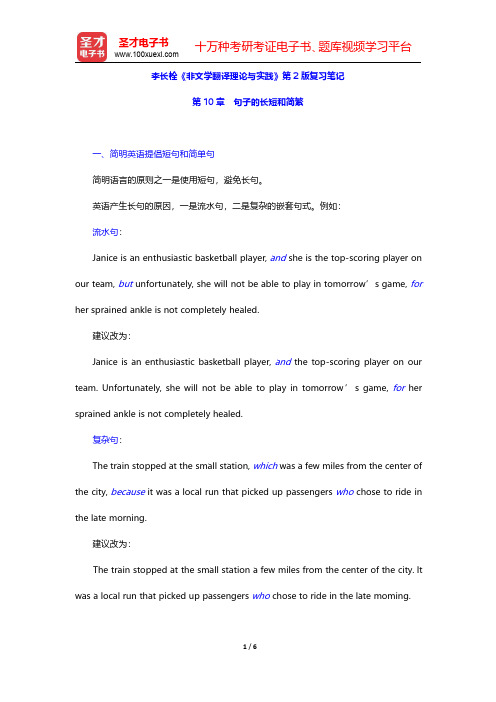
李长栓《非文学翻译理论与实践》第2版复习笔记第10章句子的长短和简繁一、简明英语提倡短句和简单句简明语言的原则之一是使用短句,避免长句。
英语产生长句的原因,一是流水句,二是复杂的嵌套句式。
例如:流水句:Janice is an enthusiastic basketball player,and she is the top-scoring player on our team,but unfortunately,she will not be able to play in tomorrow’s game,for her sprained ankle is not completely healed.建议改为:Janice is an enthusiastic basketball player,and the top-scoring player on our team.Unfortunately,she will not be able to play in tomorrow’s game,for her sprained ankle is not completely healed.复杂句:The train stopped at the small station,which was a few miles from the center of the city,because it was a local run that picked up passengers who chose to ride in the late morning.建议改为:The train stopped at the small station a few miles from the center of the city.It was a local run that picked up passengers who chose to ride in the late moming.二、汉译英时化长为短,化繁为简汉译英时有两类长句值得注意。
- 1、下载文档前请自行甄别文档内容的完整性,平台不提供额外的编辑、内容补充、找答案等附加服务。
- 2、"仅部分预览"的文档,不可在线预览部分如存在完整性等问题,可反馈申请退款(可完整预览的文档不适用该条件!)。
- 3、如文档侵犯您的权益,请联系客服反馈,我们会尽快为您处理(人工客服工作时间:9:00-18:30)。
李长栓《非文学翻译理论与实践》第2版复习笔记第11章核心句分析:克服句法障碍的有效手段核心句分析的基础,是对相关背景和知识的透彻理解。
通过核心句分析,可以迫使译者查找资料或更加细致地阅读原文,在更深的层次理解原文。
一、核心句种类奈达认为英语中所有的句子都可以分解为以下7种结构的核心句:·John ran quickly.·John hit Bill.·John gives Bill a ball.·John is in the house.·John is sick.·John is a boy.·John is my father.二、核心句分析核心句分析的实质是找到“谁做了什么”。
进行核心句分析时,我们通常需要先找到“动作”。
在英语中,动作可能由一个动词表示,也可能由名词化动词(nominalization)。
找到动作后,再根据逻辑关系、百科知识或常识,找到这个动作的发出者。
例:Our lack of knowledge about local conditions precluded determination of committee action effectiveness in fund allocation to those areas in greatest need of assistance.按表层结构翻译为:由于对当地情况缺乏了解,无法确定在向最需要援助地区提供资金时,委员会行动的有效性。
核心句分析:·We did not know local conditions·We could not determine sth·(Committee)allocated fund to areas effectively·Some areas needed assistance most根据各句之间存在的关系,“翻译”为简明易懂的英语:Because we knew nothing about local conditions,we could not determine how effectively the committee had allocated funds to areas that most needed assistance.翻译为:由于我们不了解当地情况,无法确定委员会是否有效地向最需援助的地区提供了资金。
三、核心句分析在汉译英中的应用英语提倡简单句。
作为译者,我们虽然不能苛求作者都使用简单句、短句,但我们可以运用一些技术手段,使译文更加简明易懂。
翻译时,按照逻辑关系,对原文进行重组。
1.翻译复杂句结构复杂的句子,不容易一下子翻译出来,如果对其进行分解,可以变得较为容易。
例:保险人应保障被保险人由于货物遭受机器设备运输保险内所承保的风险造成工程中断或延误所引起的还本付息及固定成本的赔偿。
(合同)这句话结构非常复杂,难以一下子翻译出来。
我们可以先对它进行核心句分析:·(如果)货物遭受机器设备运输保险内所承保的风险If its goods are exposed to risks covered by machinery and equipment transportation insurance·(如果)机器设备运输保险内所承保的风险造成工程中断或延误If risks covered by machinery and equipment transportation insurance cause disruption or delay of the project·(如果)工程中断或延误引起(被保险人)还本付息及固定成本(损失)If the disruption or delay of the project cause losses related to debt service and fixed costs·(保险人)应赔偿被保险人还本付息及固定成本损失The insurer must compensate the insured for its losses related to debt service and fixed costs通过分析发现原文少了“损失”,翻译时应当补上。
在此基础上进行翻译:译文l:The insurer must compensate the insured for its losses related to debt service and fixed costs if:a)its goods are exposed to risks covered by machinery and equipment transportation insurance;b)the risks result in disruption or delay of the project;andc)the disruption or delay result in losses related to debt service and fixed costs.这个句子虽然仍然是一个长句,但结构简化了许多,每一个分句都不长,而且在外观上显得清楚明了。
如果你愿意,可以把以上翻译变为结构复杂的句子,像原文一样,但这样做不一定可取:译文2:The insurer must compensate the insured for losses related to debt service and fixed costs incurred by the insured when the aroject is disrupted or delayed as a result of its goods being exposed to risks covered by the machinery and equipment transportation insurance.2.翻译长句长句翻译时经常需要断句。
断句实际就是一种核心句分析和重新组合。
例:第二,中国现有的外交战略是建立在国际社会基本承认各国的独立自主权为基础的,但以美国为首的西方国家在人权问题尤其是科索沃问题上采取新干涉主义的立场,这不仅是对中国主张和坚持的以不干涉内政为核心的建立国际政治新秩序构成了威胁,而且也对中国按自己主张解决国内问题的原则形成了潜在的威胁。
首先把长句拆分为短句,并按照事务发展的顺序排列:·第二,中国现有的外交战略是建立在独立自主权基础上的China’s current strategy is based on the principle of independence of all nations.·国际社会基本承认各国的独立自主权The principle has been generally recognized in the international community.(使用被动语态是为了与上文衔接)·中国主张和坚持建立以不干涉内政为核心的国际政治新秩序China calls for the establishment of a new international political order based on non-intervention in the internal affairs of any country.·中国坚持按自己的主张解决国内问题的原则China asserts that each countryshould handle its own domestic affaks as it sees fit.·但以美国为首的西方国家在人权问题尤其是科索沃问题上采取新干涉主义的立场对中国的主张/原则构成了威胁。
But these principles are being challenged by the ne0—interventionist approach to human rights issues that has been adopted by Western nations following the lead of the United States,as exemplified in the Kosovo case.(使用被动语态是为了与上文衔接)适当调整后变为:The second pillar of China’s current strategy is the principle of independence of all nations,which has been generally recognized in the international community. China proposes that a new intemational political order be established based on non-intervention in the internal affairs of any country,and asserts that each country should handle its own domestic affairs as it sees fit.These principles are challenged,however,by the neo-interventionist approach to human rights issues, led by the United States and adopted by Western nations,as exemplified in the Kosovo case.3.翻译主题句汉语往往先用介词短语(关于、对于、至于等)提出问题,然后再加以阐述。
英语中虽然也有类似结构,但用得不多。
翻译时,多数情况下需要把汉语的主题句变为英语普通句子。
可以通过简单的核心句分析,摆脱汉语结构的束缚。
例:(1)对献血者,发给营养补助费和副食品票证,职工献血当日算公休,照发工资;农村社员照记工分。
Blood donors were given nutrition allowances and coupons to obtain meat,poultry and eggs.Donors did not have to work on donation day:workers were paid as usual and farmers received credits for a day’s work.(2)至于世界经济暂时的不景气,中国民航业有着充足的信心去克服。
